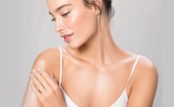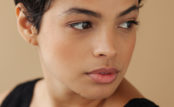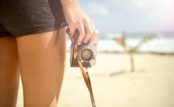There’s more than enough hurt from hair loss to go around and punch more than 85% of American men right in the ego. This stat, from the American Hair Loss Association, which claims that two-thirds of guys will experience noticeable hair loss by 35. Nudge that figure up 20% when he hits 50.
Now where does this leave you?
For some guys it’s not a big deal. There are guys who just make it cool to have less hair or none. Examples: Vin Diesel, Jason Statham, and of course, the baddest man ever, John McClane (aka Bruce Willis), every terrorist’s nightmare and litmus test of masculinity from 1989 to present day (son: “I’m not really into hugging family.” McClane: “Damn straight”).

Yippee Ki-Yay Mother Russia!
Of course, you’re not Bruce Willis (and if you are, man, you rock), and though the guy’s a stud, we don’t all rock the hairless hardcore with such dripping efficacy. This leaves you wanting treatment for hair loss, be it surgical, pharmaceutical, or, as smart guys do, natural.
To build on that last point, natural hair loss treatment consists of the vitamins and hair-growing foods that encourage the hair you’ve got to sprout forth and multiply. You can also reduce hair loss naturally, with a proven treatment like Profollica, which uses herbals and amino acids to address the main culprit behind genetic hair loss.
Bear in mind, though, you can lose hair for a variety of reasons. And when hair loss is not genetic, it’s wise to look for the issue responsible.
Non-Genetic Hair Loss
Genetic hair loss accounts for roughly 90% of strands lost from scalps across the United States. That leaves ten percent of folks losing hair for reasons other than the genes passed to them by Mom and Dad.
You can lose hair for many reasons actually, and that’s not always bad news. When hair loss is non-genetic, it’s often reversible, with medication, dietary and lifestyle changes to address the condition that’s causing the problem.
Non-genetic causes of hair loss include:
thyroid problems
autoimmune disease
blood thinning medication
birth control pills
burns and injury
nutrient deficiency
cosmetic procedures
Hair loss from these causes may be evident in clumps of hair left on your pillow, in the shower or hairs plucked out by your comb. This form of hair loss is often rapid and necessitates a visit to your physician. Your health comes first. Get that sorted out and your hair will deal with itself.
Genetic Hair Loss
Most hair loss is genetic. And though men tend to experience more noticeable hair loss than women, roughly 60% of the fairer sex will lose hair as well.
Researchers have learned much about hair loss over the past several decades. We’ve long known that hair loss occurs when a male sex hormone called dihydrotestosterone (DHT) attacks the hair follicles. And last year, a new discovery that men with hair loss have an abundance of a lipid called Prostaglandin D2 may help researchers further treat hair loss at the cellular level.
Contrary to what you may have heard, there’s no evidence that hair loss comes from your mother’s side of the family. Hair loss appears to be inherited from both parents; in men it can start as early as the teenage years and is evident along the hair line and crown of the head.
 Women too may experience noticeable hair loss at a similarly young age, though rarely to the degree that men experience. Most often it’s a gradual thinning, later in life, and develops as an overall loss of volume rather than in the concentrated areas that men experience.
Women too may experience noticeable hair loss at a similarly young age, though rarely to the degree that men experience. Most often it’s a gradual thinning, later in life, and develops as an overall loss of volume rather than in the concentrated areas that men experience.
At the present time, you’re not going to outrun hair loss if it runs in the family. Though you might delay it with Rogaine or even grow new hair with Propecia (don’t do this – details later), DHT is a stubborn fellow. Give him time and he’ll shrink your follicles, until one day they’re gone.
Fortunately, you might further delay hair loss with the right combination of diet and natural hair loss supplements. Not only is this safer than Propecia, studies suggest it’s relatively effective.
The Best Vitamins For Hair Growth
Plentiful hair needs nutrients to grow. You’ll get that through diet, healthy lifestyle tips and natural hair loss supplements like Profollica.
Try the following vitamins. They’re not only proven to encourage hair growth, they’ve got all sorts of health and beauty benefits, like better skin and immune function. As a bonus, zinc and iron may help your libido.
Biotin – A water-soluble B vitamin, biotin is required for cell growth and metabolism of fats and amino acids. There are few rich dietary sources of this hair-friendly nutrient; your best bet might be with a dietary supplement.
Iron deficiency should be diagnosed by your doctor, as excess levels of iron can lead to a dangerous condition known as iron overload.
Vitamin B12 – One of the best vitamins for your mane, vitamin B12 is believed to assist with the formation of red blood cells, which in turn carry oxygen to your follicles.
Niacin – An organic compound, niacin may stimulate blood and oxygen circulation to the scalp. Research suggests that niacin is more effective when taken with biotin.
Zinc – You need this essential mineral for a variety of functions, including cell reproduction and synthesis of proteins. And you’ll see deficiency of it in, you guessed it, hair loss.
Iron – Studies suggest that people who lose hair tend to have lower levels of iron in their bloodstream. There’s a catch to this however, in that iron deficiency should be diagnosed by your doctor, as excess levels of iron can lead to a dangerous condition known as iron overload.
Foods That Promote Hair Growth
Want another reason to ditch processed and greasy fare proffered at fast food establishments across the nation? Consider this: the foods you eat affect your looks. In fact, some foods can even stimulate hair growth.
Food alone won’t work miracles. Your genes will run their course whether you like it or not. What these foods can do, however, is ensure you’re getting the nutrients your body needs to maximize the hair you’re programmed to keep.
 Salmon – You’ll have a difficult time finding a better beauty food than this oily cold-water fish. Wild salmon bursts with protein and vitamin D, both essential to strong hair, and has enough inflammation-fighting omega-3 fatty acids to feed both your scalp and that organ in your noggin.
Salmon – You’ll have a difficult time finding a better beauty food than this oily cold-water fish. Wild salmon bursts with protein and vitamin D, both essential to strong hair, and has enough inflammation-fighting omega-3 fatty acids to feed both your scalp and that organ in your noggin.
Walnuts – Omega-3 fatty acids constitute about three percent of the hair shaft. And you’ll get more of that omega-3 goodness in walnuts, with a hair-friendly dose of biotin, vitamin E and copper, the latter of which helps to protect your natural color.
Oysters – An aphrodisiac? Yes – but oysters are great for hair growth as well thanks to those sky high levels of zinc. There’s plenty of protein in oysters too. That helps, as it constitutes about 97% of hair’s structure.
Sweet Potatoes – Beta-carotene is linked to a healthy glow that makes people more attractive. That’s according to a Scottish study, released in 2010, and though that effect was more pronounced with carrots, sweet potatoes offer plenty of beta-carotene for your scalp, which your body converts to vitamin A and uses to produce natural oils that, among other things, prevent dandruff.
Eggs – There aren’t many food sources that offer more protein than eggs. But there’s more hair-goodness in these little guys than that – eggs pack four key minerals for hair growth: zinc, selenium, iron and sulfur, the importance of which can’t be understated.
Spinach – Your parents told you to eat your green vegetables as a kid. But did you know that spinach feeds iron, folate and vitamin C to your follicles? True to form, this allows for production of scalp oils and better circulation of oxygen where it’s needed.
Lentils – They’re tiny. They’re mighty. And boy, they’re great for your hair! Lentils have protein, iron, zinc and biotin.
Greek Yogurt – Scan the ingredients list of many hair products and you’ll find they often have pantothenic acid. You can get that naturally in greek yogurt, along with a good dose of protein and vitamin D, which is also linked to follicle health, though researchers have yet to find the connection.
Poultry – Look over this list and you’ll see a common theme: most foods that grow hair are high in protein. Yet this list would not be complete without poultry, and the zinc, iron and B vitamins that make chicken, turkey, duck and related fare some of the best foods for your hair.
Rogaine: Works Primarily For Younger Men
It’s not natural, and it doesn’t work for everyone with hair loss. But Minoxidil, better known as Rogaine, can preserve hair along the temples and may reduce hair loss in early stages.
Women can also use Rogaine, though they tend to have more success with a two percent concentration of the medication than with its stronger five percent formula.
We still don’t know how Rogaine grows hair. Indeed, Rogaine was originally developed as a blood pressure medication, until researchers noticed it had the curious side effect of hair growth. Some speculate that it opens the blood vessels and potassium channels that feed nutrients to the follicles. In any event, it may reduce frontal hair loss.
Rogaine doesn’t work for everyone though. Researchers have documented its hair growth in younger men – typically under 40 – and appears less effective against the broad, progressive hair loss that develops with age.
Side effects of Rogaine include eye irritations, chest pain, dizziness, fast heart beat and fainting. Keep it away from Fluffy too; Rogaine is lethal to cats.
Propecia: Don’t Do it
Propecia will test just how much you want to preserve your locks. And after reading this article, you may want to give it a pass.
 Propecia is a 5-alpha-reductase inhibitor. Unlike Rogaine, Propecia does treat the cause of genetic hair loss in that it inhibits conversion of testosterone to DHT. This makes it possibly the most effective hair loss medication to date, with roughly 86% of men reporting less hair loss over ten years.
Propecia is a 5-alpha-reductase inhibitor. Unlike Rogaine, Propecia does treat the cause of genetic hair loss in that it inhibits conversion of testosterone to DHT. This makes it possibly the most effective hair loss medication to date, with roughly 86% of men reporting less hair loss over ten years.
The down side? Risk of anxiety, depression, prostate and male breast cancer. And more stuff that’ll make you cringe: Propecia is linked to a variety of sexual side effects, from birth defects and loss of ejaculate to erectile dysfunction.
In some guys, these side effects are permanent.
Such reports were enough to convince the Swedish Medical Products Agency to warn clients of the risks. Adding further weight to the situation, in April 2012 the FDA ordered Propecia manufacturers Merck & Co to label the product with warnings of the long-term sexual side effects that it may cause.
There is, however, another option for men who want natural treatment for hair loss. And in a clinical study, it reduced hair loss in 90% of study participants.
Profollica: The Best Natural Treatment For Hair Loss
You’re wise to avoid pharmaceutical hair loss medications in favor of a natural hair loss treatment. Studies show that the right combination of hair-friendly vitamins and minerals can protect hair lost from genetic reasons with results comparable to prescription medication.
The key here is the right natural treatment. You’re looking to address the root cause of hair loss – excessive levels of DHT – and reduce it without the side effects linked to hair loss medications like Propecia.
Try Profollica. It’s a two-part natural hair recovery system of a daily supplement and an activator shampoo with trichogen. The former has many of the vitamins and nutrients we’ve discussed in this article, including biotin and zinc oxide. The activator gel has trichogen, which is reported to reduce hair loss in 90% of guys.
 Remember, hair loss is a common issue. If you pull it off with a John McClane-esque who-gives-a-rat’s-behind, congratulations. You’ll never have to worry about hair loss again.
Remember, hair loss is a common issue. If you pull it off with a John McClane-esque who-gives-a-rat’s-behind, congratulations. You’ll never have to worry about hair loss again.
But if it remains an issue, fight it with natural hair loss treatment – with hair-growing foods and ideally Profollica – and you’re in better shape to retain those locks and the confidence they bring to your life.




